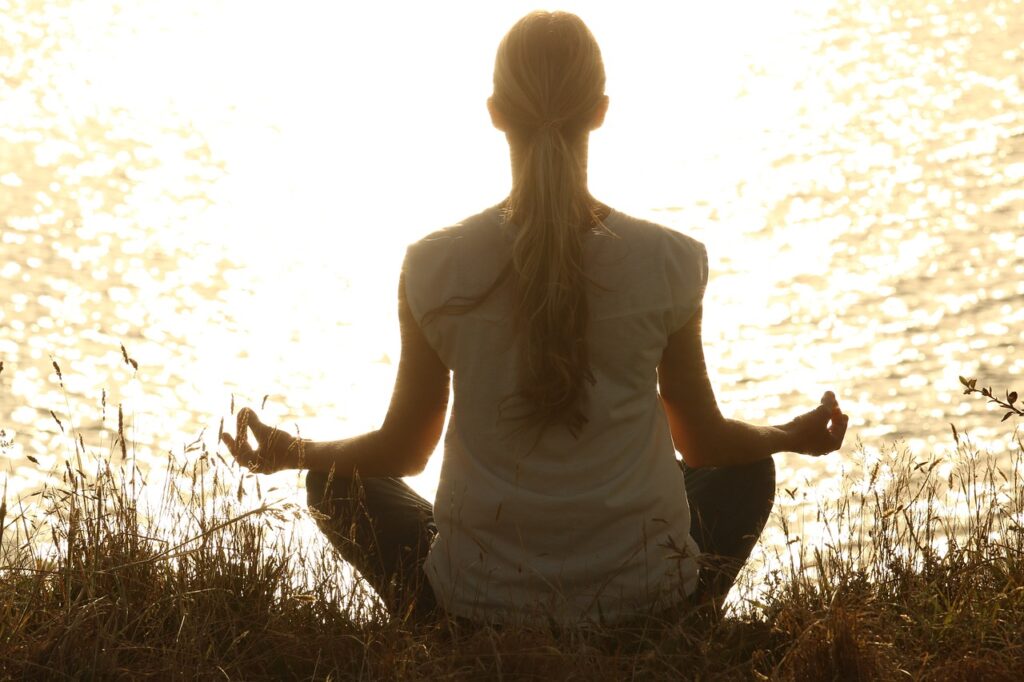Mastering the Art of Daily Meditation

Meditation is more than just sitting in silence—it is a powerful tool for cultivating inner peace, self-awareness, and emotional balance. It matters because it transforms the way we experience life, helping us respond rather than react, observe rather than judge, and be present rather than distracted.
Why Meditation Matters
- Meditation Cultivates Inner Peace
- In a world filled with noise and distractions, meditation provides a sanctuary of stillness.
- It helps reduce stress and anxiety by calming the nervous system and promoting relaxation.
- Regular practice rewires the brain, making us less reactive to external chaos and more anchored in inner stability.
- Meditation Strengthens Self-Awareness
- We spend most of our lives on autopilot, reacting to situations without fully understanding our emotions and thoughts.
- Meditation brings us into direct contact with our inner world, helping us recognize our patterns, fears, and desires with clarity.
- With greater awareness, we can make conscious choices rather than being driven by impulses.
- Meditation Improves Focus & Mental Clarity
- Just as exercise strengthens the body, meditation trains the mind to stay focused.
- It improves concentration, enhances memory retention, and reduces mental fatigue.
- By practicing mindfulness, we learn to direct our attention where we choose, rather than being pulled in every direction by distractions.
- Meditation Enhances Emotional Well-being
- Helps develop emotional resilience—we become less overwhelmed by negative emotions.
- Increases self-compassion and kindness toward ourselves and others.
- By observing emotions without attachment, we can process them in a healthy, non-reactive way.
- Meditation Deepens Connection to Life & Spiritual Growth
- Many spiritual traditions emphasize meditation as a path to self-discovery and enlightenment.
- It helps us feel more connected to nature, others, and the universe.
- Whether or not one has a spiritual belief, meditation fosters a deep sense of purpose and fulfillment.
- Meditation Helps Build Daily Presence & Gratitude
- We often live in the past or worry about the future—meditation trains us to fully embrace the present moment.
- With presence comes gratitude, as we start appreciating life’s small, beautiful moments.
- One of the best quotes I have ever encountered is “Happiness is not something we chase; it is something we cultivate in stillness.”
Meditation is like training a muscle—the more we practice, the stronger it becomes.

How Habits are Formed
One of the most effective ways to establish a consistent meditation practice is by understanding how habits are formed. The Cue → Routine → Reward cycle, popularized by behavioral psychologists, explains how habits become ingrained in our daily lives. When applied to meditation, this framework helps turn meditation from an occasional practice into a sustainable daily habit.
Cue (Trigger) – The Reminder to Meditate: A cue is the event or trigger that reminds you to meditate. Since our days are filled with distractions and responsibilities, setting a reliable cue ensures that meditation naturally integrates into your routine.
- Time-Based Cue: Meditating at the same time every day (e.g., right after waking up or before bed).
- Habit Stacking: Pairing meditation with an existing habit (e.g., after brushing your teeth, drinking coffee, or finishing a workout).
- Environmental Cue: Setting up a designated meditation space—just seeing your cushion, mat, or a candle can signal it’s time to meditate.
- Emotional Cue: Using moments of stress or overwhelm as a trigger to take a few mindful breaths instead of reacting impulsively.
Tip: Choose a cue that is already a natural part of your day, so meditation seamlessly fits into your routine!
Once the cue occurs, the next step is the routine, which in this case is the act of meditating.
How to Make the Routine Easier to Maintain:
- Start Small: Begin with just 2–5 minutes daily. This removes the mental resistance of needing “extra time” to meditate.
- Make It Enjoyable: If traditional seated meditation feels difficult, try guided meditations, mindful walking, or breath awareness.
- Use an Anchor: A mantra, deep breaths, or a timer can help signal the start of the session and ease into the practice.
- Be Flexible, Not Rigid: If you miss a day, don’t feel discouraged—just return to the practice the next day.
Tip: Focus on consistency over duration—meditating daily for 5 minutes is more powerful than one long session per week!
Reward – The Positive Reinforcement: A reward is what makes the brain want to repeat the behavior. When we associate meditation with positive outcomes, we become more likely to stick with it long-term.
The Natural Rewards of Meditation:
- Immediate Reward: A sense of calm, relaxation, and mental clarity after even a short session.
- Long-Term Reward: Over time, meditation reduces stress, anxiety, and emotional reactivity, leading to greater well-being.
- Identity-Based Reward: The feeling of being “someone who meditates” strengthens your commitment to the practice.
Tip: To reinforce the habit, take 5 seconds after meditating to acknowledge how you feel (lighter, clearer, more grounded). This helps the brain associate meditation with a positive experience!
Overcoming Common Challenges:
- “I don’t have time” → Start with just 2 minutes a day.
- “My mind is too busy” → That’s normal; meditation is about awareness, not stopping thoughts.
- “I forget to do it” → Pair meditation with an existing habit (e.g., after brushing teeth or before bed).
Exploring Different Techniques
Our individual journey to enlightenment is unique, and offers several avenues of exploration, and just like any new skill we learn, we have to start somewhere. Exploring different meditation techniques allows individuals to find the practice that best suits their needs, mindset, and lifestyle.
Mindfulness Meditation: Mindfulness meditation, rooted in Buddhist traditions, emphasizes present-moment awareness. Practitioners focus on their breath, bodily sensations, thoughts, and emotions without judgment. This practice trains the mind to observe thoughts as they arise rather than becoming attached to them, helping to reduce stress and enhance emotional regulation. Mindfulness meditation can be practiced anywhere—whether sitting quietly, walking, or even engaging in daily activities like eating. Studies suggest it improves focus, reduces anxiety, and promotes overall mental clarity.
Guided Meditation: Guided meditation is an excellent option for beginners or those who struggle with self-guided meditation. This technique involves following verbal instructions provided by a teacher, a recorded voice, or an app. The guide may use visualization, breathing exercises, or body relaxation techniques to lead the practitioner into a state of deep relaxation. Guided meditation is especially beneficial for stress relief, improving sleep, and enhancing self-awareness. Many apps and online resources offer a variety of guided sessions tailored to specific needs, such as reducing anxiety, improving confidence, or fostering gratitude.
Transcendental Meditation (TM): Transcendental Meditation is a technique that involves silently repeating a specific mantra—a word or sound with no particular meaning—to enter a deep state of relaxation and heightened awareness. TM is typically practiced for 15-20 minutes twice a day while sitting comfortably with eyes closed. Unlike mindfulness meditation, which focuses on awareness of the present moment, TM encourages the mind to transcend ordinary thought processes and reach a deep state of restful alertness. Research has shown that TM can reduce stress, improve cardiovascular health, and enhance overall mental clarity.
Loving-Kindness Meditation (Metta Meditation): Loving-kindness meditation, or Metta meditation, is a practice that cultivates compassion, love, and goodwill toward oneself and others. Practitioners silently repeat phrases such as “May I be happy, may I be healthy, may I be safe,” before extending these wishes to loved ones, acquaintances, and even difficult individuals. This practice helps reduce negative emotions, increase empathy, and foster a sense of interconnectedness with others. Studies indicate that regular practice can enhance positive emotions, reduce stress, and improve relationships.
Body Scan Meditation: Body scan meditation involves systematically bringing awareness to different parts of the body, typically from head to toe. Practitioners focus on physical sensations, tension, or discomfort without attempting to change anything. This technique is particularly effective for reducing stress, improving sleep, and enhancing the mind-body connection. Body scan meditation is often used in mindfulness-based stress reduction (MBSR) programs to help individuals manage chronic pain and anxiety.
By exploring these diverse meditation techniques, individuals can find a method that resonates with them, ultimately fostering mental clarity, emotional resilience, and overall inner peace. Whether seeking relaxation, spiritual growth, or emotional healing, meditation offers a powerful tool for self-improvement and well-being.
By experimenting with various techniques, individuals can discover the most effective method to enhance mental clarity, emotional well-being, and overall peace.

Meditation is a powerful tool that, when consistently applied, has the potential to be life-changing. By cultivating mindfulness, self-awareness, and emotional resilience, meditation helps individuals navigate life’s challenges with greater clarity and inner peace. It reduces stress, lowers anxiety, and enhances overall mental well-being by training the mind to focus on the present moment rather than being consumed by worries or regrets. Meditation also fosters emotional balance, allowing individuals to respond to situations with calmness and compassion rather than reacting impulsively. Physically, it has been shown to lower blood pressure, improve sleep, and boost the immune system. Over time, a regular meditation practice can rewire the brain, strengthening areas associated with focus, happiness, and emotional regulation. Whether used for stress relief, self-discovery, or spiritual growth, meditation empowers individuals to live more fulfilling, balanced, and purposeful lives. Namaste
